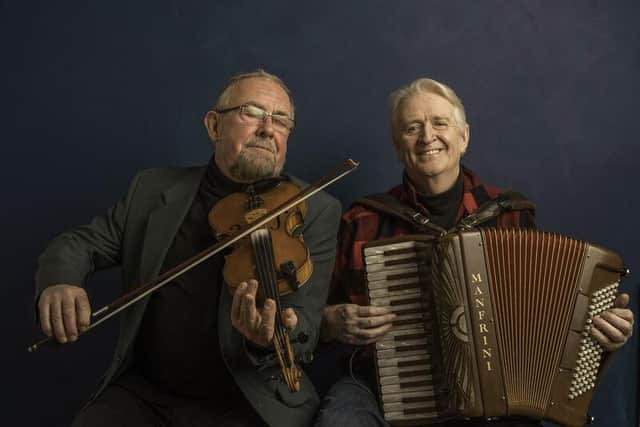EIF reviews: Project Smok | Catriona Price & Friends | Aly Bain & Phil Cunningham
MUSIC
Catriona Price & Friends ***
The Hub


Transposing to live performance her debut album Hert – local dialect for “heart”, a striking exploration of home, identity and environment, based on Orcadian writing, must have presented a challenge for Orcadian fiddler, singer and composer Catriona Price. Her nine-piece ensemble, however, including strings, harp, piano, and drums, performed it with panache.
Price, along with harpist Esther Swift and flautist Sarah Hayes, handled vocals as a trio, although their swooping harmonies could make lyrics hard to catch and became somewhat shouty amid the surge of Storms. George Mackay Brown’s Swans, however, was a limpid vocal drift.
The pre-recorded Orcadian voices of the opening title poem tended to be obscured by beaty accompaniment, but there was no mistaking the message in No Such Thing as Belonging, a bittersweet disquisition on “home” delivered with swingy smeddum by jazz violinist and vocalist Seonaid Aitken.
Plaintive vocal and string harmonies cusped Pam Beasant’s poem If…, contemplating islands inundated by climate change but defiantly resilient. Along with a wistful string piece, St Sophia, written for Price’s other ensemble, Thirteen North, plus an effervescent encore of Björk’s So Quiet, it suggested there’s plenty more to come from such venturesome creativity.
Jim Gilchrist
MUSIC
Aly Bain & Phil Cunningham ****
The Hub
Listening to Aly Bain and Phil Cunningham in concert is rather like accessing musical memory banks – theirs and the listener’s. Well into their fourth decade of playing together, “Aly and Phil”, as the fiddle and accordion duo are affectionately known, have a vast repertoire to tap into, while those of us who have been listening to them for longer than we’d care to remember greet what they choose to play with fond familiarity.
You know what you’re going to get – easeful performance interspersed with droll badinage – increasingly, these days, about ageing – and some more than twice-told tales which still raise a laugh, and you relax into it. Thus their opening set was a familiar one – the crisp measure of the pipe march Shores of Loch Bee, switching into reels from Bain’s native Shetland, concluding with the familiar Barrowburn, delivered with brio (“That was a wee bit faster than we’d hoped,” remarked the fiddler, feigning relief).
Cunningham is a prolific composer of airs and waltzes and here he included his old-time style waltz, Dr Robbie Shepherd MBE, in tribute to the lately departed broadcaster (followed, naturally, by a witty reminiscence about Shepherd), as well as a fine slow air he wrote for the late Irish piper Liam O’Flynn, fiddle singing sweetly over the swell of accordion.
Both Bain and Cunningham have travelled extensively in their own right, and souvenirs from that Celtic troubadour globetrotting here included material from Scandinavia and French Canada. An Estonian waltz led into some Louisiana Cajun tunes with easeful fluidity, while Bain’s well-seasoned American fiddle set gave us the lovely waltz Midnight on the Water then the tempestuous Napoleon’s Retreat, ringing and skittering on re-tuned fiddle strings.
Jim Gilchrist
MUSIC
Project Smok ***
The Hub
A high-energy trio from Scotland’s burgeoning “neo-trad” scene, Project Smok combine the virtuoso attack of whistle player and piper Ali Levack, 2020’s Radio Scotland Young Traditional Musician of the Year, with guitarist Pablo Lafuente and bodhrán player Ewan Baird.
They deliver with blistering energy and impressively empathetic cohesion, evident from their opening set, Levack’s low whistle playing all breathy swoops, overtones and rapid-fire ornamentation, over Lafuente and Baird’s tightly syncopated accompaniment.
Their performance tended to be crowd-pleasing, foot-stomping stuff, audience cheering as Levack brought in Highland pipes to climax some sets. Higher whistle notes were occasionally piercing, with amplification that seemed a bit full-on for this relatively intimate venue.
There were some gentler interludes – an echoing slow air, a “song without words” dedicated to Lafuente’s family and a nicely measured 2/4 pipe march credited to Levack’s grandfather, then was it back into yet more supercharged, super-breathy whistle pyrotechnics.
For this listener at least, tempering that relentlessly full-on musical muscle with more nuance would have been welcome. Try telling that to a delighted house, however: when was the last time you saw an Edinburgh International Festival audience out of their seats bopping – and to a whistle player, no less?
Jim Gilchrist